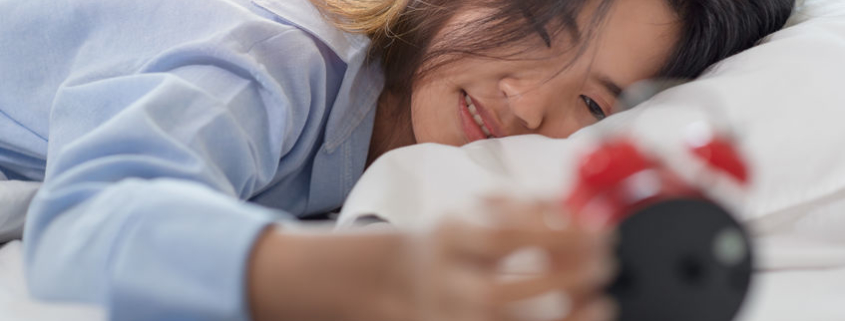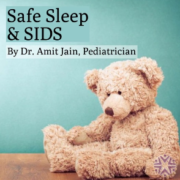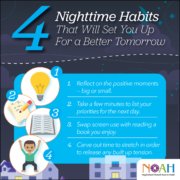Sleep Awareness Week – Healthy Sleep Hygiene
By Katelyn Millinor, LPC | Behavioral Health Quality Manager
Healthy sleep, also known as sleep hygiene, describes good sleep habits. Guidelines and tips NOAH offers patients for better sleep comes from years of expert research and experience. And, while there are medications that can help with sleep, they are usually only helpful in the short-term. Your NOAH provider can talk about the best ways to get better sleep, but in general, we recommend healthy sleep hygiene as the main most important step.
Healthy Sleep Tips
- Consistency – One of the best ways to sleep well is to go to bed and get up at the same time every day (even on the weekends). This regular rhythm will help you feel better and help to set your biological clock.
- Exercise – Regular exercise is a good idea regardless, but it also helps with sleep making it easier for your body for you to fall asleep and have deep sleep. Avoid exercising 3-4 hours before bed time. Morning walks are a great way to start the day feeling refreshed.
- Don’t Toss & Turn – If you cannot fall asleep after about 15-20 minutes, get up and do something calming or boring until you feel sleepy again (in another room if possible). Sitting quietly on the couch or reading something are good options.
- Limit Light – Avoid certain lights before going to bed, particularly screens. Cell phones, computers, televisions, and other devices have blue light that disrupts sleep. Change the settings on your device to switch the light at a set time every night, and turn off overhead lights or lamps.
- Don’t Watch the Clock – People who struggle with sleep often watch the clock too much. Frequently checking the clock can wake you up more and reinforce negative thoughts.
- Eat a Healthy Diet – A healthy, balanced diet will help you to sleep well. But when you eat matters! Do not go to bed hungry because that can disturb sleep. Also, a big meal before bed can also disturb sleep. If you are hungry before bed, try a light snack and be sure to avoid greasy or heavy foods near bedtime.
- A Bed is a Bed – Don’t allow your bed to become your kitchen, dining room, office or other multi-functional space.
- Avoid Naps – Avoid taking a nap so you are tired at bedtime. If you must take a nap, make sure it is only for 20-60 minutes and is at least 6+ hours before bedtime, ideally no naps after 3 p.m.
- No Alcohol, Caffeine, or Nicotine – If you plan to have caffeine, alcohol, or nicotine (cigarettes, cigars, etc.) don’t have any 4-6 hours before going to bed. These substances act as a stimulant and interfere with the ability to fall or stay asleep.
- Fewer Beverages – Try not to have too many beverages in the evening. This will limit the night-time trips to the bathroom.
- Set The Mood – The right environment is important. Your bed and bedroom should be comfortable for sleeping; a cool, quiet, and dark environment is best.
- Shower or Bath – Having a hot shower or bath 1-2 hours before bedtime can help you relax and get a better sleep.
- Routines – Having an evening routine before bedtime can prepare the body and mind for sleep. You can develop your own routine such as stretching, baths, or breathing exercises. Daytime routines are equally as important to having healthy sleep, so try to keep those the same.
As always, if you are trying these tips with little or no success, give your NOAH provider a call and we’ll gladly meet with you to discuss options in achieving a good night’s rest. At NOAH, we’ll work with you and your family to choose the best path for overall health and wellness. You may also request an appointment online.











Trackbacks & Pingbacks
[…] Develop healthy sleep patterns by going to sleep and waking up at the same time every day. Exercise regularly, but don’t work out at least three to four hours before bedtime. […]
Comments are closed.